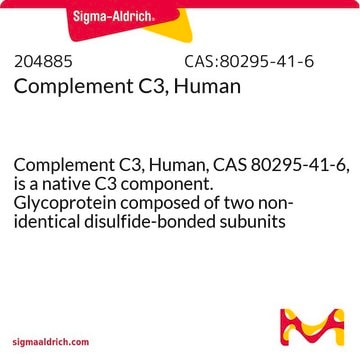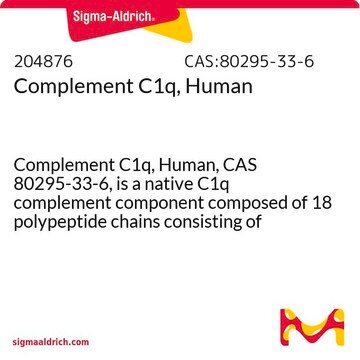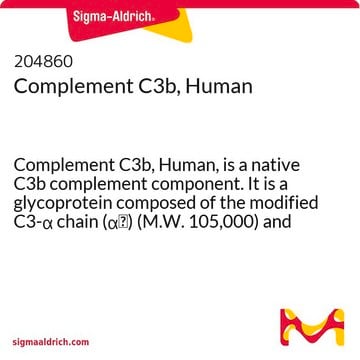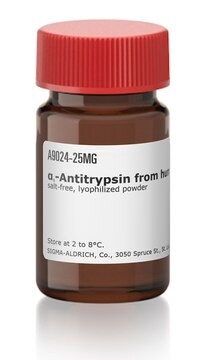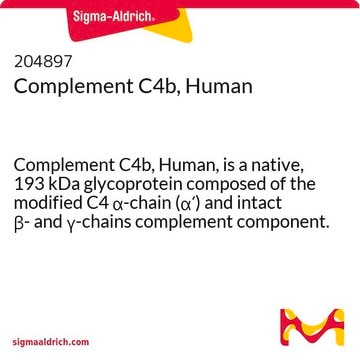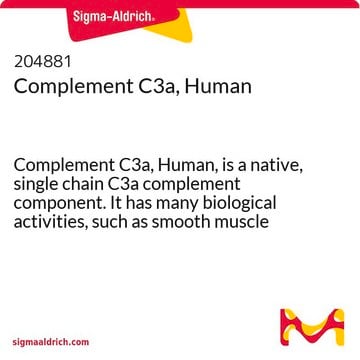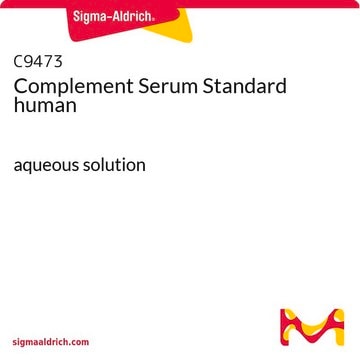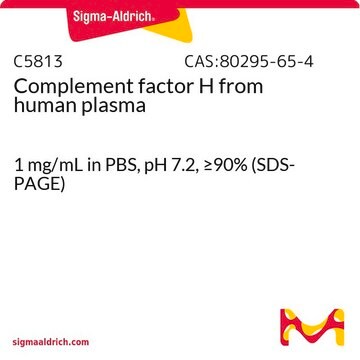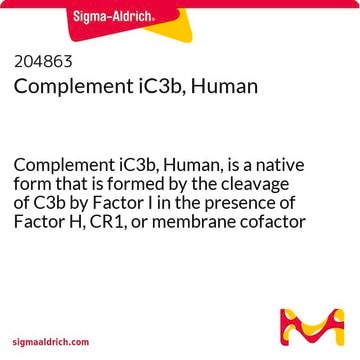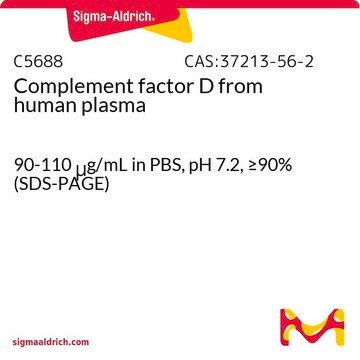C2910
Complement C3 from human serum
≥3000 C3H50 units/mg (using C3 deficient serum)
Sign Into View Organizational & Contract Pricing
All Photos(1)
About This Item
Recommended Products
biological source
human
Quality Level
Assay
≥85% (SDS-GE)
form
solution
specific activity
≥3000 C3H50 units/mg (using C3 deficient serum)
mol wt
185 kDa (disulfide-linked heterodimer)
technique(s)
activity assay: suitable
UniProt accession no.
shipped in
dry ice
storage temp.
−70°C
Gene Information
human ... C3(718)
Looking for similar products? Visit Product Comparison Guide
Application
Complement C3 is important in complement activation through the classical and alternative pathways. Complement C3 has been used in studies of bacterial defense against the complement system. Research on streptococcus infection has shown that Streptococcal pyrogenic exotoxin B (SPE B), a cysteine protease, can prevent phagocytic activity via cleavage of the C3 and impairing the pathways of the compliment system. C3 deficiency can result in recurrent infections and immune complex disorders. Recent research has shown that inherited C3 deficiency can occur either through homozygous mutations or through compound heterozygous mutations,
Biochem/physiol Actions
Complement C3 is the third and most abundant component of the complement pathway. It plays a central role in complement activation, being involved in both the classical and alternative pathways. C3 or its proteolytic fragments mediate many biological functions such as opsonization and anaphylatoxin activities. Pro-C3 is synthesized as a large single chain of 185 kDa and is processed to a disulfide-linked heterodimer consisting of an α-chain (115 kDa) and a β-chain (70 kDa) in the plasma. C3 is cleaved by the C3 convertases in either pathway (C4b2a, C3iBb, C3bBb) to C3b (176 kDa) comprised of the large C-terminal portion of the α-chain and the β-chain. C3b interacts with other complement components to initiate the amplification cascade. Studies of C3 function have been facilitated by experimentally induced C3 deficiency in animals by injection of cobra venom factor and more recently with gene ablation technology.
Quality
Functionally pure by a hemolytic assay using deficient sera.
Physical form
Supplied as a solution in PBS, pH 7.2.
Other Notes
View more information on the complement pathway at www.sigma-aldrich.com/enzymeexplorer
Disclaimer
RESEARCH USE ONLY. This product is regulated in France when intended to be used for scientific purposes, including for import and export activities (Article L 1211-1 paragraph 2 of the Public Health Code). The purchaser (i.e. enduser) is required to obtain an import authorization from the France Ministry of Research referred in the Article L1245-5-1 II. of Public Health Code. By ordering this product, you are confirming that you have obtained the proper import authorization.
Storage Class Code
10 - Combustible liquids
WGK
WGK 3
Flash Point(F)
Not applicable
Flash Point(C)
Not applicable
Certificates of Analysis (COA)
Search for Certificates of Analysis (COA) by entering the products Lot/Batch Number. Lot and Batch Numbers can be found on a product’s label following the words ‘Lot’ or ‘Batch’.
Already Own This Product?
Find documentation for the products that you have recently purchased in the Document Library.
Customers Also Viewed
P Randhawa et al.
American journal of transplantation : official journal of the American Society of Transplantation and the American Society of Transplant Surgeons, 15(4), 1014-1020 (2015-03-05)
Neutralizing antibodies (NAbs) form the basis of immunotherapeutic strategies against many important human viral infections. Accordingly, we studied the prevalence, titer, genotype-specificity, and mechanism of action of anti-polyomavirus BK (BKV) NAbs in commercially available human immune globulin (IG) preparations designed
Chih-Feng Kuo et al.
Infection and immunity, 76(3), 1163-1169 (2008-01-05)
Streptococcal pyrogenic exotoxin B (SPE B), a cysteine protease, is an important virulence factor in group A streptococcus (GAS) infection. The inhibition of phagocytic activity by SPE B may help prevent bacteria from being ingested. In this study, we examined
L Singer et al.
Pathobiology : journal of immunopathology, molecular and cellular biology, 62(1), 14-28 (1994-01-01)
The third complement component (C3) is a multifunctional glycoprotein that interacts with numerous serum proteins, cell surface receptors, and membrane-associated regulatory proteins. Deficiencies of C3 have been reported in several human kindred of different ethnic backgrounds and from different geographic
Bin Li et al.
Toxicological sciences : an official journal of the Society of Toxicology, 107(1), 144-155 (2008-10-22)
The expectation from the literature is that organophosphorus (OP) agents bind to proteins that have an active site serine. However, transferrin, a protein with no active site serine, was covalently modified in vitro by 0.5mM 10-fluoroethoxyphosphinyl-N-biotinamido pentyldecanamide, chlorpyrifos oxon, diisopropylfluorophosphate
Yutaka Terao et al.
The Journal of biological chemistry, 283(10), 6253-6260 (2007-12-28)
A relative lack of neutrophils around Streptococcus pyogenes is observed in streptococcal toxic shock syndrome (STSS). Because the bacteria spread rapidly into various organs in STSS, we speculated that S. pyogenes is equipped with molecules to evade the host innate
Our team of scientists has experience in all areas of research including Life Science, Material Science, Chemical Synthesis, Chromatography, Analytical and many others.
Contact Technical Service